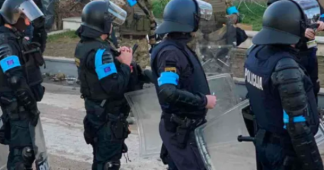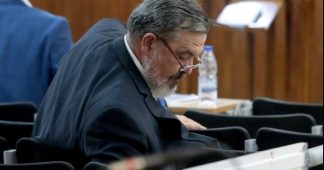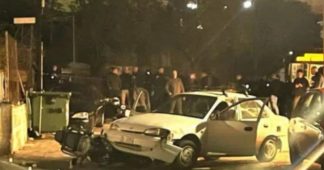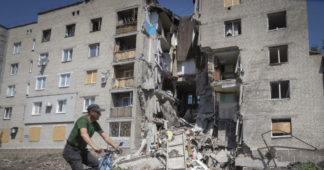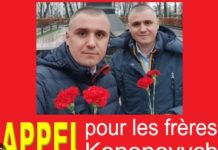They don’t speak the same language. But as they sit on the sofa, in a second-floor apartment in Athens, and the interpreter bridges the Greek-German language gap, they never stop squeezing each other’s hands. Despite the 1,120km distance, they are united by a common fate—and by the color they both wear. Black.
Serpil Temiz Unvar: her son was murdered by a Neo-Nazi in Hanau, Germany.
Magda Fyssa: her son was murdered by a Neo-Nazi in Piraeus, Greece.
By Corina Petridi, Stavros Malichudis
Mar 23, 2023
On February 19, 2020, at exactly 10pm security cameras recorded 43-year-old Tobias R. getting out of his car, a few meters away from the Arena Bar, in the German city of Hanau, near Frankfurt.
Two seconds later, Tobias R. shot 22-year-old Vili Viorel Păun, who was sitting in the driver’s seat of a parked car.
He then headed to a kiosk adjacent to the Arena Bar. At least five gunshots followed.
At the same time, people inside the Arena Bar started to run, searching for an escape route. They had heard the shots, while one of the witnesses saw Tobias R. enter the next door-door, carrying a gun. Arena Bar regulars knew that the emergency exit was always locked, as a result of frequent police raids.
People were trapped inside the bar.
The assailant spotted them and shot at them 16 times. He fled the scene of the crime, and the police tried to track him down — an investigation by Forensic Architecture and Forensis later highlighted the failures and inadequacies of the authorities that night.
Tobias R. was found dead in his home later that night. Using the same weapon from the attack, he shot and killed his mother and then killed himself.
The 43-year-old was not unknown to the authorities. Just three months before the attack, he had sent a letter to the German Prosecutor’s Office, warning of an “intelligence agency” which hacked citizens’ brains, while on his website he called for the “total annihilation” of certain minorities from Africa, Asia, and the Middle East.
After all, the places he had targeted for the attack were not a random choice. The victims were four Germans of Turkish, Kurdish, Afghan and Romanian descent, while two Turks, a Romanian, a Bosnian and a Bulgarian were also murdered. The attack was classified as an act of far-right terrorism, as the assailant had chosen victims he believed to be “non-German”.
“Racism is poison, hatred is poison,” said Chancellor Angela Merkel.
“Germany is our country too”
Among the victims of that night was Ferhat Unvar. Ferhat, 23, had just completed his training as a heating installations technician. His cousin, Aydin Yilmaz, told The New York Times that Ferhat had never visited Kurdistan, his parents’ homeland.
“It’s important to say that he was born in Hanau. He’s a German. It was an act of terror against us all,” Yilmaz said.
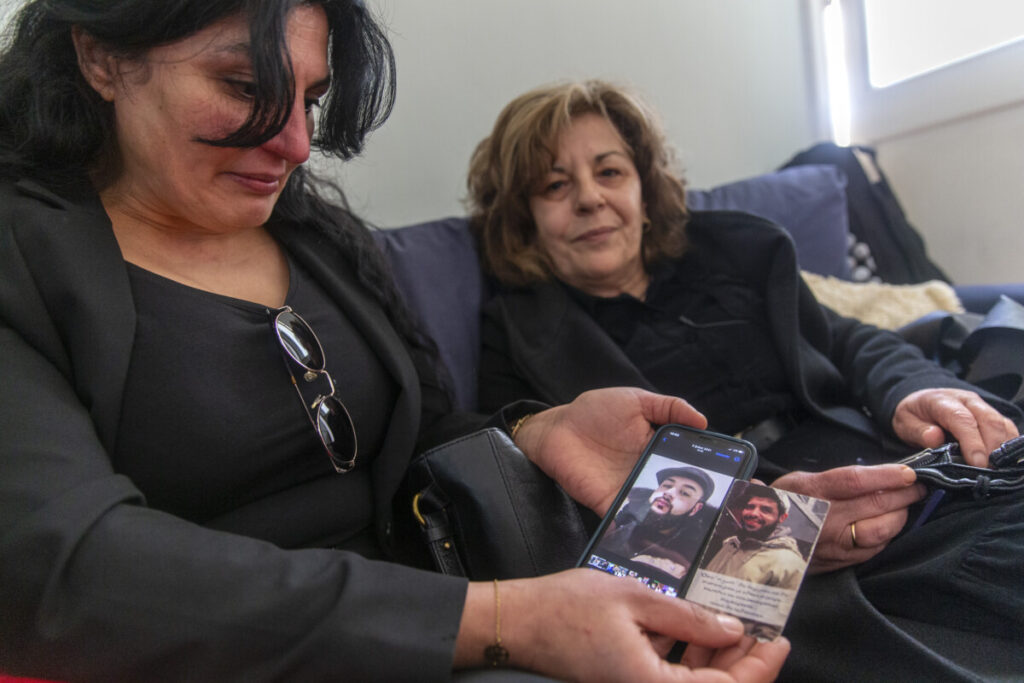
On Ferhat’s birthday in November 2020, his mother, Serpil Temiz Unvar, created a foundation in her son’s memory, Bildungsinitiative Ferhat Unvar, an anti-racist education initiative, where young educators (aged 15-30) visit German schools and talk to students about the attack in Hanau, as well as about racist discrimination within the school system.
The school visits convey the central message that “Germany is our country too” and that both immigrants and the children of immigrants, who are born and raised in Germany, have a say in the country’s future.
Sherpil still remembers the racism her son experienced growing up, which is something that pains her to this day, she says. She knows that her son was not the only one who was discriminated against in the education system.
Most children, she says, deal with the stress and pressure to work and try harder in order to be accepted, when it should be the job of the education system to support these kids and ensure their integration.
“Go find Magda”
Now, three years after the attack, Serpil Unvar is preparing the next step: the creation of a European network of mothers who have lost their children to racist attacks.
The first meeting was held on Friday, March 3, with Magda Fyssa, mother of anti-fascist musician Pavlos Fyssa, who was murdered by members of Golden Dawn, a Neo-Nazi organization.
On September 17, 2013, Pavlos Fyssas was murdered in his neighborhood in Piraeus by a Golden Dawn “assault squad”. For decades, the Neo-Nazi organization existed on the fringes of the political scene, but from 2012 to 2019, they were voted into Greek Parliament.
While dozens of attacks on immigrants and political opponents had preceded it, Fyssas’ murder led to the prosecution of Golden Dawn, and to its leaders being convicted of running a criminal organization in October 2020.
On the day of their meeting, Serpil Unvar had accompanied Magda Fyssa to the trial’s hearing in the second degree.
“I wanted to begin in Greece, with Magda. The aim of the visit is to get to know each other, so that we can, if we want to, join forces and unite, so our voices can be heard in other countries, initially in Europe, and then beyond,” explained Serpil.
Asked why she chose Magda Fyssa as her first point of contact, Serpil replied that she felt very close to Magda when she saw her in court, on the day that the Greek justice system condemned Golden Dawn as a criminal organization.
Upon exiting the courtroom, Magda Fyssa had shouted: “You did it, my son.” Sherpil remembers that she immediately felt a connection with this woman because when she achieves something, she too, turns to her son and tells him that he has achieved it.
“Ever since I heard Magda speak the same words, I connected with her and wanted to meet her, even before there was even a thought of any international networking. It was also something personal, something my own. It was as if my son himself wrote to me, saying “go find Magda”.
The idea is to network through the foundations that have already been created in memory Pavlos and Ferhat.
Both women agreed that the aim of the network is not only the support of those who have lost their children, but also to coordinate a European network, and organize initiatives to fight against racist crime.
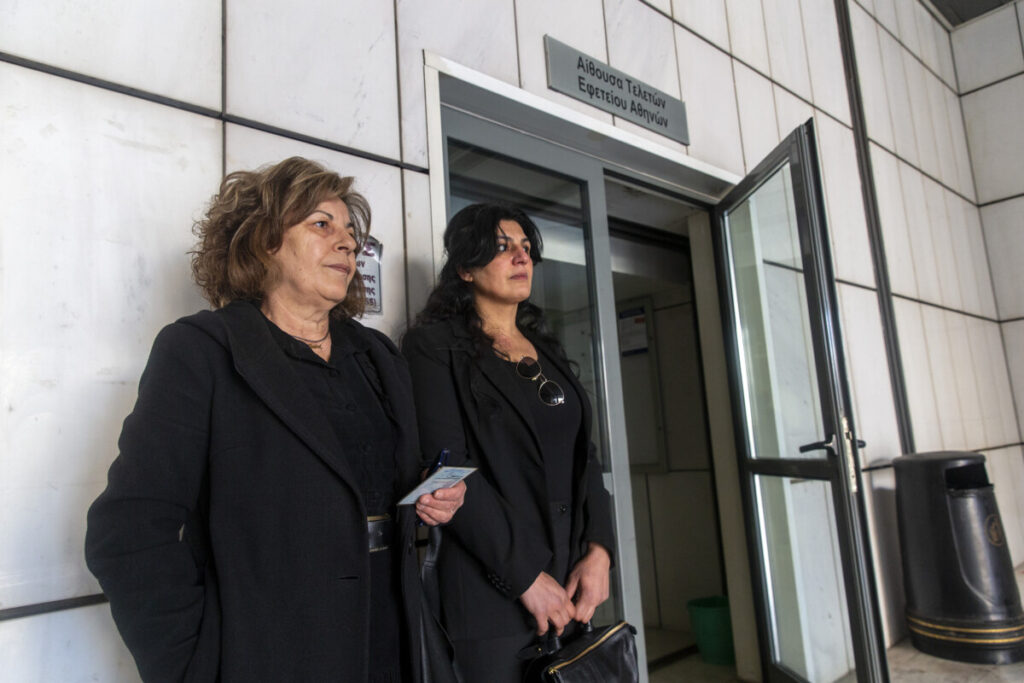
“Dead only when we are forgotten”
This is a significant step for them and on a personal level. Through their collective initiatives in recent years, the two women feel that they are fulfilling a part of their sons’ dreams.
“We’re both trying to make our sons’ dreams come true. For the young people who left with their dreams unfulfilled. And maybe this will help us stand on our feet, so that we can at least leave something behind, something of the dreams they had,” said Magda Fyssa.
And she added, “When I leave this life to join him in the next one, I want to be able to look him in the eyes. That’s what I’m interested in− looking him in the eye and saying ‘I did my best’, and I see that she wants the same. And not only her, but also all the mothers who lost their children.”
Serpil is still trying to make sense of this “meaningless act”. She emphasizes how random it was that her son was in that bar that night. Ferhat had just finished his training and since he had more free time, he decided to stay out for a few hours longer that night.
“Ferhat himself had written: ‘We will only be dead when we are forgotten.’ That phrase is now my mission,” she said.
“And we will do it – they won’t be forgotten.”
We remind our readers that publication of articles on our site does not mean that we agree with what is written. Our policy is to publish anything which we consider of interest, so as to assist our readers in forming their opinions. Sometimes we even publish articles with which we totally disagree, since we believe it is important for our readers to be informed on as wide a spectrum of views as possible.
